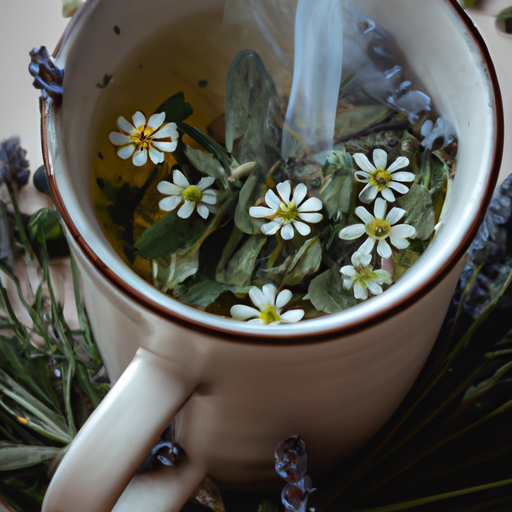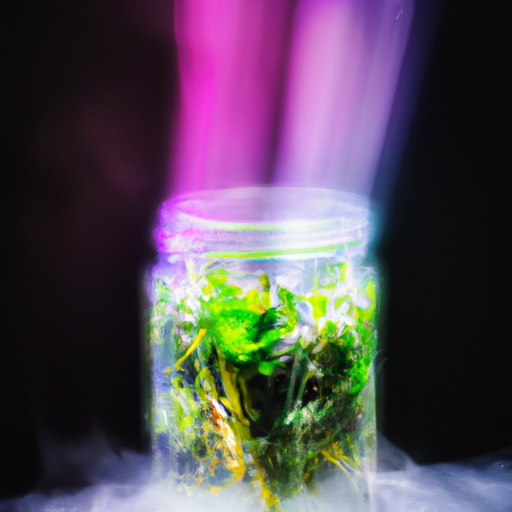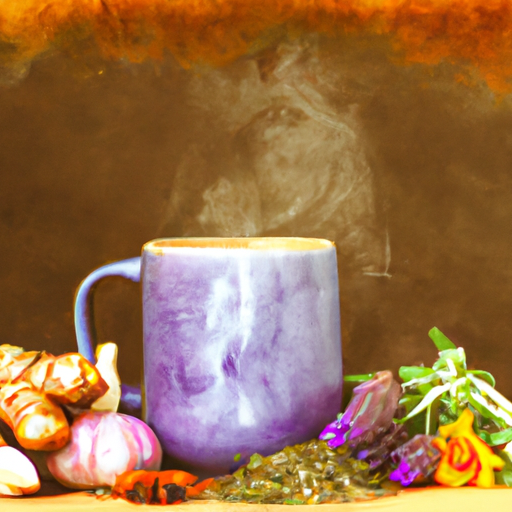Picture your nose as a jam-packed highway during peak traffic hours, filled with cars tightly packed and no end in sight. Similar to that standstill traffic, congestion can make you feel irritated and unable to breathe easily.
But fear not, because there is a natural remedy that can help clear those roadblocks and bring back the ease of open airways – herbal tea.
Herbal teas have been used for centuries to soothe various ailments, and when it comes to congestion, they can be a game-changer. Like a gentle breeze that clears away the fog, herbal teas can provide relief and restore your ability to breathe with ease.
In this article, we will explore the best herbal teas for congestion, each with its unique therapeutic properties. From the refreshing and invigorating peppermint tea to the soothing and decongesting ginger tea, we will delve into the benefits of these herbal brews.
So, grab your favorite mug, breathe in the aromatic steam, and let’s discover the power of herbal tea in relieving congestion.
Key Takeaways
- Peppermint tea is a natural decongestant that can open up airways and reduce inflammation.
- Eucalyptus tea, derived from eucalyptus leaves, can alleviate congestion and promote easy breathing.
- Ginger tea has anti-inflammatory properties, improves circulation, boosts immune function, and provides relief for congestion.
- Chamomile tea is an anti-inflammatory and antispasmodic that reduces inflammation in nasal passages and relaxes airway muscles.
Peppermint Tea: A Refreshing Remedy for Congestion
If you’re feeling stuffy, look no further than peppermint tea to clear your sinuses and provide instant relief. Peppermint tea has numerous benefits when it comes to congestion. It acts as a natural decongestant, helping to open up your airways and reduce inflammation. The menthol in peppermint tea soothes and calms irritated nasal passages, making it easier to breathe.
To make homemade peppermint tea for congestion, simply bring water to a boil and add a handful of fresh peppermint leaves or a peppermint tea bag. Let it steep for about 5 minutes, then strain and enjoy. Drink this tea a few times a day to help alleviate your congestion and feel refreshed.
Eucalyptus Tea: Clearing the Airways Naturally
Eucalyptus tea is a refreshing and invigorating remedy that naturally opens up your airways. It’s derived from the leaves of the eucalyptus tree, which contain eucalyptus oil known for its numerous health benefits. When brewed into a tea, eucalyptus helps to alleviate congestion and promote easy breathing.
The benefits of eucalyptus oil include its anti-inflammatory, antiseptic, and decongestant properties. This makes it an excellent choice for relieving nasal and chest congestion caused by colds or allergies.
To prepare eucalyptus tea, start by boiling water and adding a few fresh eucalyptus leaves or a few drops of eucalyptus oil to a cup. Allow it to steep for about 5 minutes before straining and enjoying. Another option is to use eucalyptus tea bags which are readily available in health stores.
Regardless of the method you choose, eucalyptus tea is a natural and effective way to clear your airways and find relief from congestion.
Ginger Tea: Soothing and Decongesting
When you brew ginger tea, the warm and spicy aroma fills the room, providing soothing relief and helping to clear your airways. Ginger tea offers numerous benefits for congestion.
-
It reduces inflammation: Ginger contains compounds called gingerols, which have anti-inflammatory properties that can help reduce the inflammation in your airways, easing congestion.
-
It improves circulation: Ginger has been shown to improve blood circulation, which can enhance the delivery of oxygen and nutrients to your respiratory system, promoting healing and reducing congestion.
-
It boosts immune function: Ginger has immune-boosting properties that can help your body fight off respiratory infections, preventing congestion from worsening.
To make ginger tea, simply steep fresh ginger slices in hot water for 10-15 minutes. You can also add lemon or honey for added flavor and additional health benefits.
Incorporating ginger tea into your daily routine can provide natural relief for congestion.
Chamomile Tea: Relaxation and Relief for Congestion
Brewing a cup of chamomile tea, with its soothing and floral aroma, can bring relaxation and provide much-needed relief for stuffy noses and blocked airways.
Chamomile tea has been used for centuries as a natural remedy for congestion, due to its anti-inflammatory and antispasmodic properties. It can help reduce inflammation in the nasal passages and relax the muscles that constrict the airways.
To make chamomile tea at home, start by boiling water and adding a chamomile tea bag or loose chamomile flowers to a cup. Let it steep for about 5 minutes, then strain and enjoy. For added benefits, you can also add a squeeze of lemon or a teaspoon of honey to enhance the taste and provide extra soothing properties.
In addition to relieving congestion, chamomile tea has other benefits such as promoting relaxation and improving sleep quality. It can also help with digestion and reduce anxiety.
So, next time you’re feeling congested, why not brew a cup of chamomile tea and experience its healing benefits firsthand?
Lemon Tea: Boosting Immunity and Easing Congestion
To give your immune system a boost and find relief from a stuffy nose, why not try sipping on a comforting cup of lemon tea? Lemon tea is a natural remedy for cold and flu symptoms, thanks to its powerful antioxidant properties. Here are two ways lemon tea can help ease congestion:
-
Lemon tea is rich in vitamin C, which’s known to strengthen the immune system. By boosting your immune system, lemon tea can help your body fight off the cold or flu virus more effectively, reducing congestion and easing symptoms.
-
The antioxidants found in lemon tea can help reduce inflammation in the respiratory system, which can lead to congestion. These antioxidants can also help clear mucus and phlegm, providing relief from a stuffy nose.
Overall, incorporating lemon tea into your daily routine can provide holistic relief for congestion, thanks to its natural remedies and antioxidant properties.
Thyme Tea: A Natural Expectorant for Congestion
If you want to alleviate congestion and promote expectoration, thyme tea is a natural remedy that can provide relief and support your respiratory system. Thyme is known for its potent antimicrobial and expectorant properties, making it an excellent choice for congestion relief. Drinking thyme tea can help soothe irritated airways, loosen mucus, and promote its expulsion from the respiratory tract.
To make thyme tea at home, follow these simple steps:
- Boil 1 cup of water.
- Add 1-2 teaspoons of dried thyme leaves to a teapot or mug.
- Pour the boiling water over the thyme leaves.
- Let it steep for 5-10 minutes.
- Strain the tea and enjoy.
Thyme tea not only helps with congestion, but it also offers numerous benefits for respiratory health. The key components in thyme, such as thymol and carvacrol, have been shown to have antimicrobial and anti-inflammatory effects, which can help fight respiratory infections and reduce inflammation in the airways. Incorporating thyme tea into your daily routine can provide natural relief and support for your respiratory system.
Nettle Tea: Relieving Allergies and Congestion
Moving on from the previous subtopic on thyme tea, let’s explore another herbal remedy for congestion: nettle tea. As someone who’s personally experienced the discomfort of allergies and congestion, I can attest to the effectiveness of nettle tea in providing relief.
Nettle tea, derived from the stinging nettle plant, has been used for centuries to alleviate allergy symptoms and nasal congestion. It works by reducing inflammation and inhibiting the release of histamine, the chemical that triggers allergy symptoms. Additionally, nettle tea is rich in antioxidants, vitamins, and minerals, which support overall immune health.
To make nettle tea, simply steep dried nettle leaves in hot water for about 5 minutes. You can also add a touch of honey or lemon for added flavor.
Incorporating nettle tea into your daily routine may offer a natural and holistic solution to alleviate congestion and allergies.
Frequently Asked Questions
Are there any potential side effects or risks associated with drinking herbal teas for congestion?
Potential risks and side effects of herbal teas for congestion include allergic reactions, interactions with medications, and digestive issues. While they may provide short-term relief, their effectiveness for long-term congestion relief is not well-supported by scientific evidence.
Can herbal teas be used as a long-term solution for congestion or are they only effective for short-term relief?
Herbal teas can provide short-term relief for congestion, but their long-term effectiveness is limited. While they offer various benefits, such as soothing the respiratory system, it is important to address the underlying causes of congestion for a more sustainable solution.
How frequently should I drink herbal teas for congestion in order to experience the maximum benefits?
To experience maximum benefits, incorporate herbal teas into your daily routine for congestion relief. Drink them multiple times throughout the day, focusing on the best time for maximum relief, such as morning and evening.
Are there any specific herbal tea blends that are known to be particularly effective for congestion relief?
The top herbal tea blends for congestion relief include peppermint, eucalyptus, and ginger. To make homemade herbal teas for congestion relief, steep these herbs in hot water for 10-15 minutes.
Can herbal teas interact with any medications I may be taking for congestion or other health conditions?
Herbal teas can interact with medications for congestion and other health conditions. It’s important to consult with a healthcare professional to ensure safe and effective use. Common herbal teas for congestion relief include peppermint, eucalyptus, and ginger.
Conclusion
In conclusion, when it comes to finding the best herbal tea for congestion, there are several options that can provide relief and promote overall wellness. From the refreshing and invigorating peppermint tea to the soothing and decongesting ginger tea, these herbal remedies have been backed by evidence for their effectiveness in alleviating congestion.
Additionally, the immune-boosting properties of lemon tea and the allergy-relieving effects of nettle tea make them valuable additions to any congestion-fighting regimen. So why not embrace the power of nature and sip your way to clearer airways? As the saying goes, "A cup of herbal tea a day keeps congestion at bay."
"Give your immune system the natural boost it needs and enjoy the soothing benefits of herbal tea for a breath of fresh air."










